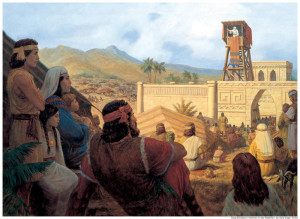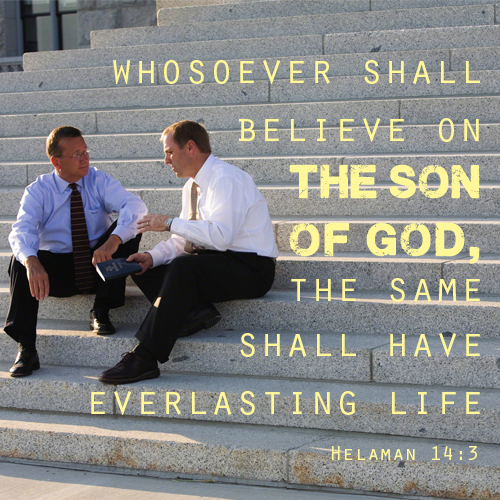 Although we had to skip a lot of great material about Jesus to get here, we are about to begin a sermon given by a great man named King Benjamin. He is one of my favorite people in the Book of Mormon. The sermon we will be studying over the next few weeks covers a wide range of gospel topics concerning Jesus Christ and His Church. Today we will focus on how King Benjamin served and how that impacts how Mormons serve their church.
Although we had to skip a lot of great material about Jesus to get here, we are about to begin a sermon given by a great man named King Benjamin. He is one of my favorite people in the Book of Mormon. The sermon we will be studying over the next few weeks covers a wide range of gospel topics concerning Jesus Christ and His Church. Today we will focus on how King Benjamin served and how that impacts how Mormons serve their church.
King Benjamin was an unusual king—more so for our time. He served as king without taking a paycheck. He earned his living with his own hands and did his leadership as a volunteer. He considered himself no better or different than anyone else in the kingdom. One of his primary goals had been to bring about peace in the land and to make certain those who were poor were cared for, a goal that required his people to live righteously and to take responsibility for those in need.
This powerful sermon was King Benjamin’s farewell address. He evaluated his service as king and arranged for his son Mosiah to take over as king. You can read the entire sermon beginning here in the Book of Mormon. This is free and you don’t have to register:
King Benjamin in the Book of Mormon
The people gathered together to hear the address, bringing animals for sacrifice and tents to stay in. So many people came that Benjamin had to speak from a tower and even then, his words had to be written down and read to the people who were too far away to hear.
Serving God without pay
The words King Benjamin spoke help to explain Mormon leadership. Mormons—the nickname some people use when talking about members of The Church of Jesus Christ of Latter-day Saints—do not have a paid clergy. No one goes to seminary to study to become a leader. Well, there actually is a seminary program, but it is for teenagers and all teens attend it. It is a weekday class held every school day and it teaches them the scriptures in-depth. While it does prepare them to serve well, it is not seminary in the traditional sense.
Mormon leadership training comes from practical experience rather than pure book learning. Children begin studying the gospel as very little children and have church lessons beginning at eighteen months. (These are very simple, short lessons tucked into a nursery experience.) Religion is taught at home and at church and most young Mormons have a good foundational knowledge of their faith. Studies of religious teens found that Mormon teenagers had an unusually high ability to talk about faith and doctrinal issues and had a strong personal commitment to their faith. This comes from having years of practical experience in which they are not just observers, but active participants.
Mormon Service
Because Mormons don’t have a professional clergy, they are led by unpaid leaders chosen to serve. Most positions are temporary. For instance, a bishop, the lay pastor for a congregation, serves about five years. When released as a bishop, he can go on to any other position for which he is chosen, whether it’s a leadership position or a ground floor position. There are no promotions or demotions, just work that needs to be done.
Since the bishop is unpaid and has to hold another job, he does not give the sermon each week. Speaking assignments are made to members of the congregation, most speaking about once a year. Children begin speaking at age three in the children’s program and at age twelve, they can give brief sermons in the regular worship service, because Mormons put great faith in their children and do not believe a teenager cannot teach an adult.
Serving in the church (any church) is an important part of a person’s religious life. It gives the person who serves a sense of connection, gives him a stake in the congregation’s success, helps him to understand how the church operates, and allows him to serve God. For Mormons, service is not reserved for a few members of clergy, but for everyone, because we are all essential to the success of God’s kingdom.
This is the message King Benjamin offered about Christianity as he launched his sermon: That serving the Lord is a blessing and a gift.
And behold also, if I, whom ye call your king, who has spent his days in your service, and yet has been in the service of God, do merit any thanks from you, O how you ought to thank your heavenly King! I say unto you, my brethren, that if you should render all the thanks and praise which your whole soul has power to possess, to that God who has created you, and has kept and preserved you, and has caused that ye should rejoice, and has granted that ye should live in peace one with another—
I say unto you that if ye should serve him who has created you from the beginning, and is preserving you from day to day, by lending you breath, that ye may live and move and do according to your own will, and even supporting you from one moment to another—I say, if ye should serve him with all your whole souls yet ye would be unprofitable servants (Mosiah 2:19-21).
About Terrie Lynn Bittner
The late Terrie Lynn Bittner—beloved wife, mother, grandmother, and friend—was the author of two homeschooling books and numerous articles, including several that appeared in Latter-day Saint magazines. She became a member of the Church at the age of 17 and began sharing her faith online in 1992.






